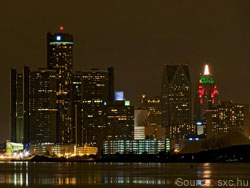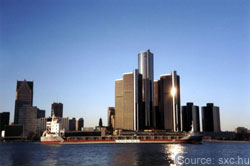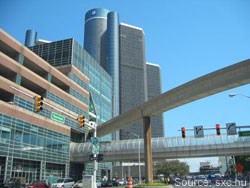 The largest city in the state of Michigan, Detroit is known for its pivotal role in the auto industry, and as the birthplace of Motown Records and many prominent black music artists and genres. A huge player in the rise of blues, soul, jazz and R&B to prominence, the city has a legacy that will go down in history.
The largest city in the state of Michigan, Detroit is known for its pivotal role in the auto industry, and as the birthplace of Motown Records and many prominent black music artists and genres. A huge player in the rise of blues, soul, jazz and R&B to prominence, the city has a legacy that will go down in history.
However, Detroit has suffered an economic downturn, with high unemployment rates and a vacancy problem that's left large portions of the city's neighborhoods abandoned and decaying. Crime rates, while decreasing since the 1970s, are still exorbitant--in 2012, the city had the highest number of violent crimes of any city with a population of 200,000.
If you are planning or considering a move to Detroit, this guide will provide you with some information to choose the best neighborhoods to settle in, the most interesting attractions to visit and what you can expect to pay for rent, real estate and other expenses.
Detroit Climate
Like the rest of southwest Michigan, the city has a humid continental climate, influenced by its proximity to the Great Lakes. Winters are cold, with night time temperatures dropping below zero about three times a year. Snowfall is moderate, blanketing the city with about 44 inches each season.
Summers are warm without being unreasonably hot--temperatures only exceed 90 degrees about 13 days a year. Severe spring and summertime thunderstorms can strike the city, bringing hail, high winds and occasional tornadoes.
Detroit Neighborhoods
The city is currently struggling with a vacancy problem--about 20 percent of homes and five percent of rentals are uninhabited. In 2009, Forbes named Detroit America's second emptiest city after Las Vegas. The city's abandoned neighborhoods are falling into decay, over run by stray dogs (an estimated 20,000 of them) and a breeding ground for crime.
However, the city still has many dynamic neighborhoods, such as the business and cultural district of Midtown, the revitalized Lafayette Park, and the historic commercial and residential area, New Center.
Registering Your Car
 Once you arrive in Michigan, you should update your registration and driver's license as soon as possible. To transfer your registration you will need proof of Michigan auto insurance, proof of identification, and your vehicle's title. You do not have to pass an emissions test to register your car in the state.
Once you arrive in Michigan, you should update your registration and driver's license as soon as possible. To transfer your registration you will need proof of Michigan auto insurance, proof of identification, and your vehicle's title. You do not have to pass an emissions test to register your car in the state.
To transfer your driver's license, you will need proof of identify, residency, and Social Security, valid Michigan auto insurance, and to pass both a vision test and knowledge test.
The update of your registration and driver's license can be done at one of the many Michigan SOS office locations.
Detroit Schools
Public education in the city is operated by Detroit Public Schools, the largest district in the state of Michigan. There are about 66,000 students enrolled in 134 facilities. Unfortunately, student performance in the city is suffering. Standardized test scores reached a record low in 2009, with students attending publicly-funded charter schools performing even worse than students in regular public schools. In 2011, just seven percent of eighth-graders reached grade-level proficiency in reading and comprehensions, and only four percent achieved grade-level proficiency in math.
There are several notable colleges in the city, including Wayne State University, a national research institution with law and medical programs, and the University of Detroit Mercy, a Catholic co-ed university.
Detroit Employment
 The automobile manufacturing industry is a major source of employment in the city and the driving force behind its economy. The world headquarters of four major auto companies--General Motors, Ford Motor Co., Daimler-Chrysler Corp, and Volkswagen of America--are located in the city. Other prominent sources of employment include the manufacture of auto parts, positions for skilled workers at research firms dedicated to alternative fuel technology, and engineering, administrative and testing functions of the "Big Three" (GM, Ford and Chrysler).
The automobile manufacturing industry is a major source of employment in the city and the driving force behind its economy. The world headquarters of four major auto companies--General Motors, Ford Motor Co., Daimler-Chrysler Corp, and Volkswagen of America--are located in the city. Other prominent sources of employment include the manufacture of auto parts, positions for skilled workers at research firms dedicated to alternative fuel technology, and engineering, administrative and testing functions of the "Big Three" (GM, Ford and Chrysler).
Other major companies located in the city include Compuware, OnStar, Blue Cross Blue Shield and HP Enterprise Services.
Unfortunately, unemployment in the city is high--18.2 percent as of December 2012, compared to the national average of 8.6 percent. If not already relocating for work, you should be advised to acquire a job before moving.
Living Costs in the City
If money will be tight when you arrive in Detroit, don't fret--living costs in the city are low at five percent below the national average. Housing is 15 percent more affordable than the average American city. The standard rate for a one-bedroom apartment in the city is just $594, and $663 for a two-bedroom. However, these averages do take into account the amount of low-income housing in the city. If you are looking to relocate to a nicer, safer neighborhood, you can expect to pay more. The average home in Detroit is listed at just $43,645.
You may pay a slight bit more for utilities--they cost about three percent more than the national average in the city. Transportation costs are two percent above average, and groceries are seven percent below the mean. Healthcare is also quite affordable--costs are one percent below the average.
Detroit Transportation
 Mass public bus service in the city is operated by the Detroit Department of Transportation. Buses run mostly within city limits, with minimal service to surrounding suburbs of Dearborn, Highland Park, Harper Woods, Livonia, Redford Township, River Rouge, and Southfield. The Suburban Mobility Authority for Regional Transportation provides more comprehensive service to the suburbs.
Mass public bus service in the city is operated by the Detroit Department of Transportation. Buses run mostly within city limits, with minimal service to surrounding suburbs of Dearborn, Highland Park, Harper Woods, Livonia, Redford Township, River Rouge, and Southfield. The Suburban Mobility Authority for Regional Transportation provides more comprehensive service to the suburbs.
For quicker, more local traveling, the People Mover is an elevated rail service that shuttles riders around a 2.9 mile loop in the downtown area.
If you plan to own a car, the Detroit has an expansive system of toll-free highways to get you around the city.
Culture and Contemporary Life
Detroit is steeped in musical history--it was a mecca for blues and soul in the 1940s, a center for jazz in the 1950s, and home of the legendary label Motown Records. Started in the 1960s by Berry Gordon, Motown Records was home to a plethora of superstar R&B hit-makers--The Supremes, The Temptations, The Four Tops, Marvin Gaye, Stevie Wonder, Smokey Robinson & the Miracles, Martha & the Vandellas, Gladys Knight & the Pips, and the Jackson 5. Today, the city is still home to many prominent live music venues such as the Fox Theatre, Music hall, the Gem Theatre, the Fillmore Detroit, the Fisher Theatre, St. Andrew's Hall, the Majestic Theatre, and many others. Any avid fan of soul music would certainly feel right at home in the city.
Greek culture is preserved and celebrated in the city's historic district of Greektown--a commercial neighborhood filled with restaurants serving authentic Greek cuisine, a Mediterranean-themed casino, Greek-inspired architecture and even traditional Greek music playing on the streets.
The city is also home to several museums, such as the Detroit Historical Museum, the Charles H. Wright Museum of African-American History, the Motown Historical Museum and the Detroit Museum of Contemporary Art. If sports are more your speed, you can catch a baseball game at the Detroit Tigers' Comerica Park, or a football game at the Detroit Lions' Ford Field.
Many exciting cultural festivals are celebrated in the city, especially those that commemorate its influential roles in the music industry and the auto industry. Some of these include the International Jazz Festival, the Electronic Music festival, the Woodward Dream Cruise car show, and its largest annual festival, Dally in the Ally, with live music, food, and beer.
Detroit Relocation Tips
- Choose a neighborhood carefully. Before choosing a place to buy a home or rent, conduct thorough research on the area. Many neighborhoods in the city have extremely high rates of violent crime. You should also research the location of any job you are applying for before you accept to ensure that it is not in a dangerous area.
- Bring a varied wardrobe. The city experiences four distinct seasons, with chilly temperatures in the winter and hot summers. Pack warm sweaters, coats, scarves, hats and snow boots for the winter months and shorts, sandals and T-shirts for the summer.
- Make sure you get moving quotes from several movers before choosing one to hire. You can start today right here at Movers.com.